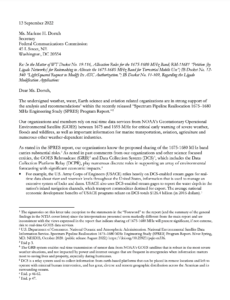On June 30, 2021, Joint Aviation Organizations filed a letter (Joint Aviation Response to Ligado Statements Jun 2021) with the FCC addressing recent misstatements by Ligado. The Joint Aviation Organizations include Aerospace Industries Association (AIA), Aircraft Electronics Association (AEA), Aircraft Owners and Pilots Association (AOPA), Airlines for America (A4A), Air Line Pilots Association, International (ALPA), Aviation Spectrum Resources, Inc. (ASRI), Cargo Airline Association (CAA), General Aviation Manufacturers Association (GAMA), Helicopter Association International (HAI), International Air Transport Association (IATA), National Air Carrier Association (NACA), National Air Transportation Association (NATA), National Business Aviation Association (NBAA), and Regional Airline Association (RAA). The letter address the following three topics:
Federal Aviation Administration (FAA) Safety Concerns. Ligado continues to claim that the Ligado Order relied upon FAA conclusions based on the most-restrictive aviation scenarios, including the Helicopter Terrain Awareness and Warning Systems (HTAWS) scenarios, and asserts that the aviation industry’s concerns about the Ligado Order’s treatment of aviation’s concerns about Unmanned Aerial Systems are “equally groundless.” These claims are not reconcilable with the reality that NTIA, the FAA’s own representative to the FCC, is on record stating that Ligado misstates the adverse effects upon civil aviation and misrepresents the Department of Transportation’s evaluation of this issue. NTIA generally supports the Joint Aviation Petition for reconsideration and other petitions filed by the aviation community, at least one GPS manufacturer, and other GPS user-stakeholders.
Tower Database Condition. The tower database condition in the Ligado Order is deficient. The FCC lacks any authority to implement an obstacle database for aviation and such action falls exclusively within the domain of the FAA. A standalone private database of nationwide airspace hazards resulting from Ligado’s deployments is without precedent and it is outside the FCC’s authority to require aircraft operators to use it. The database is also being developed by Ligado without FAA and aviation engagement and is likely to create dangerous confusion for aviation organizations, pilots, dispatchers, and other affected aviation stakeholders.
Ligado’s allegations regarding the aviation community’s lack of involvement in developing the database are false, as Ligado does not appear to have taken steps even to identify the “relevant stakeholders.” Ligado has never publicly called for participation or formally reached out to members of the aviation industry for input since adoption of the Ligado Order. Ligado contends that ASRI refuses to participate in the database’s construction or maintenance, but fails to recognize that ASRI’s primary role is managing the AES VHF and HF spectrum on behalf of domestic operators and the FCC and that ASRI does not have the required skill sets or resources for managing or implementing an obstacle database for all operators nationwide. Ligado reported that it was working on the database at a meeting of the Airlines Electronic Engineering Committee (AEEC) on April 21, 2021, that was organized to discuss satellite communications issues raised by Ligado’s proposals, but it was clear that Ligado has not yet identified, let alone commenced engagement, with the relevant aviation stakeholders to establish the necessary requirements. The importance of Ligado working with the FAA in particular to satisfy the tower database condition cannot be overstated, as the FAA would determine by its operational safety oversight authority what procedures rotorcraft and airplane pilots, dispatchers, air traffic controllers, and aviation organizations (such as airlines) must follow with respect to use of the Ligado database. If the Ligado Order is not reconsidered, Ligado must identify relevant stakeholders, publicly solicit participation in the development of the notification database, and engage with any respondents.
Inmarsat Replacement Program. There has yet to be any formal implementation plan to fund the replacement of Inmarsat aviation terminals receiving interference from Ligado operations. Despite repeated direct requests by aviation operators to Ligado and Inmarsat about where such funding would come from, there has been silence from both organizations on a formal funding plan. Private aircraft operators and organizations have no plans to self-fund such a modification at this time, and once again the Joint Aviation Organizations request guidance and information from Ligado and/or Inmarsat on their plan and who will pay for the upgrades.


